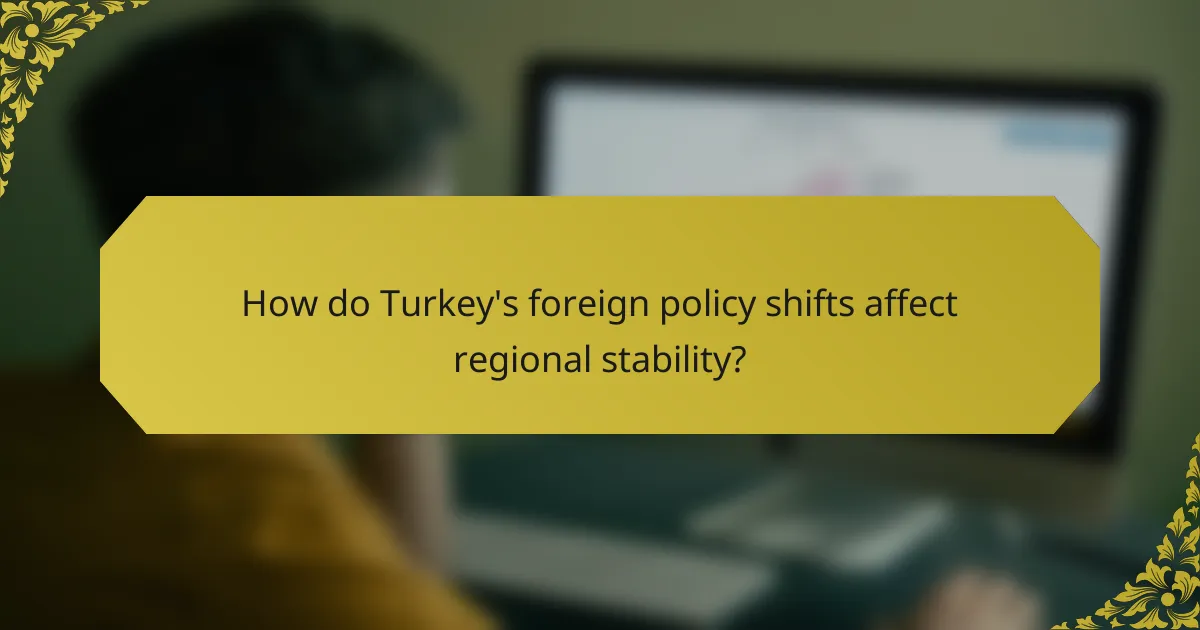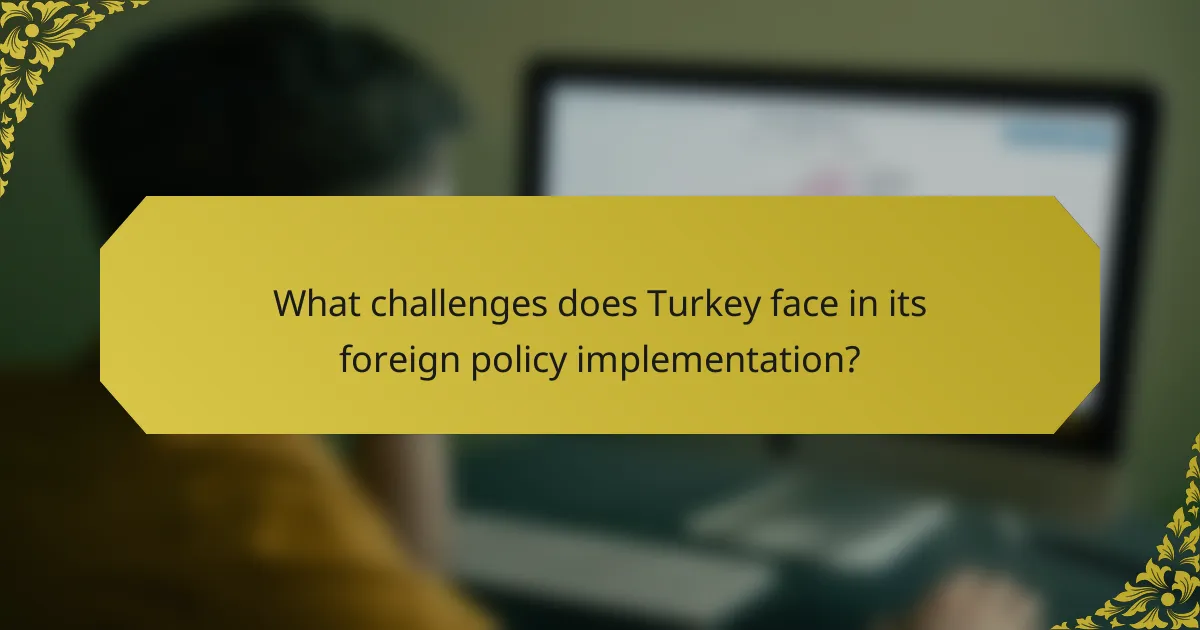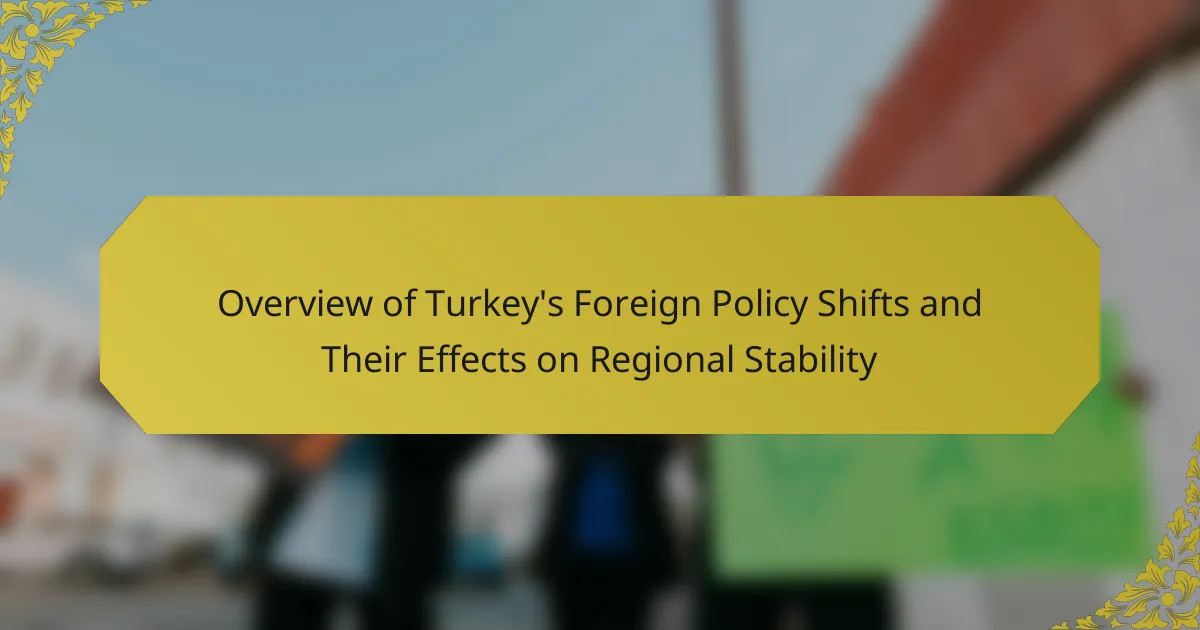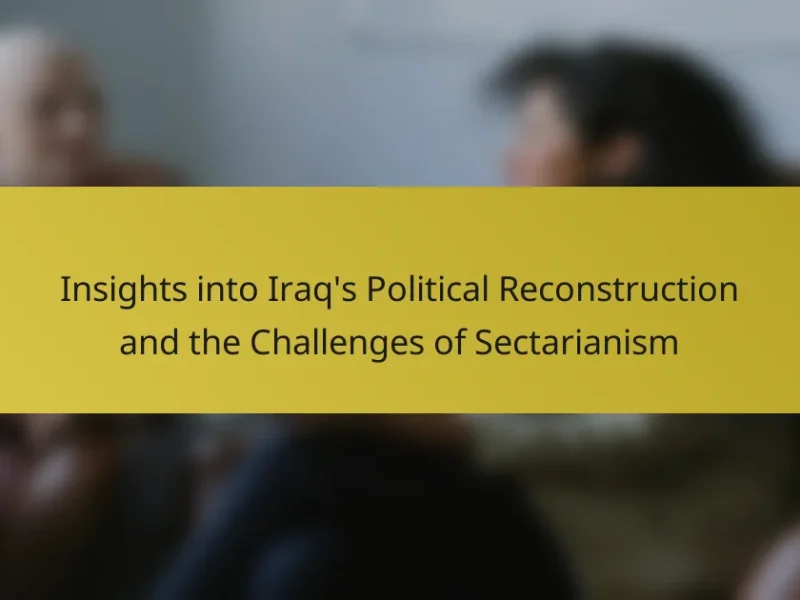
What are the key shifts in Turkey’s foreign policy?
Turkey’s foreign policy has undergone significant shifts in recent years. One key shift is the pivot towards a more assertive regional role. This includes increased military involvement in conflicts such as in Syria and Libya. Turkey has also sought to strengthen ties with non-Western powers, notably Russia and China. Additionally, there has been a move away from reliance on NATO, reflecting a desire for greater autonomy. The shift towards a more independent foreign policy is evident in Turkey’s energy exploration efforts in the Eastern Mediterranean. These changes have led to tensions with traditional allies, particularly the United States and European Union. Overall, Turkey’s foreign policy is increasingly characterized by a focus on national interests and regional influence.
How have historical events influenced these shifts?
Historical events have significantly influenced Turkey’s foreign policy shifts. The fall of the Ottoman Empire in the early 20th century marked a pivotal change. This event led to the establishment of the Republic of Turkey in 1923, which redefined its international relations. The Cold War further shaped Turkey’s alliances, particularly its strategic partnership with the United States. The 1980 military coup strengthened nationalist sentiments, impacting Turkey’s regional approach. The Arab Spring in 2011 prompted Turkey to adopt a more proactive foreign policy in the Middle East. Additionally, the Syrian Civil War has forced Turkey to reassess its borders and security policies. These historical contexts illustrate how past events have continuously shaped Turkey’s foreign policy decisions and regional stability.
What role did the Cold War play in shaping Turkey’s foreign relations?
The Cold War significantly influenced Turkey’s foreign relations by aligning the country with the West. Turkey joined NATO in 1952, solidifying its position against the Soviet Union. This alliance facilitated military and economic aid from the United States. The U.S. viewed Turkey as a critical buffer against communist expansion in the region. Turkey’s strategic location heightened its importance during the Cold War. The country also engaged in regional conflicts, often supporting U.S. interests. This alignment shaped Turkey’s foreign policy decisions for decades. The Cold War era established a framework for Turkey’s interactions with neighboring countries and global powers.
How did the Arab Spring impact Turkey’s regional strategy?
The Arab Spring significantly altered Turkey’s regional strategy by prompting a shift towards supporting democratic movements in the Arab world. Turkey aimed to position itself as a model for political reform and economic development. This included backing groups such as the Muslim Brotherhood in Egypt and other Islamist movements across the region. The Turkish government believed that promoting democracy would enhance its influence. Additionally, the Arab Spring led to a reevaluation of Turkey’s relationships with neighboring countries. Turkey sought to engage more actively in regional affairs, particularly in Syria and Libya. This involvement included humanitarian aid and military support to opposition groups. Overall, the Arab Spring catalyzed Turkey’s transition from a passive regional player to a more assertive actor in Middle Eastern politics.
What are the major themes in Turkey’s recent foreign policy?
Turkey’s recent foreign policy is characterized by a focus on regional influence, military engagement, and balancing relationships with major powers. The country aims to assert its role in the Middle East and the Eastern Mediterranean. Turkey has increased military operations in Syria and Libya to protect its interests. The government also seeks to strengthen ties with Azerbaijan and other Turkic states. Additionally, Turkey navigates complex relationships with the United States and Russia. This includes cooperation in some areas while competing in others. The themes reflect Turkey’s ambition to be a key player in regional geopolitics. These efforts are evident in Turkey’s involvement in various conflicts and diplomatic initiatives.
How does Turkey’s approach to NATO reflect its foreign policy changes?
Turkey’s approach to NATO reflects significant shifts in its foreign policy. Historically, Turkey has been a staunch ally of NATO, emphasizing collective defense. Recently, Turkey has adopted a more independent foreign policy, seeking to assert its influence in regional conflicts. This includes military interventions in Syria and Libya, showcasing a departure from NATO’s collective strategies. Turkey’s acquisition of Russian defense systems, such as the S-400, has strained relations with NATO allies. Additionally, Turkey’s support for different factions in conflicts contrasts with NATO’s unified stance. These actions indicate Turkey’s intention to prioritize national interests over traditional alliances. The evolving approach illustrates a broader trend of Turkey redefining its role on the global stage.
What is Turkey’s stance on the Syrian conflict?
Turkey supports the opposition against the Syrian government in the Syrian conflict. It aims to establish a safe zone in northern Syria. Turkey’s government is concerned about the presence of Kurdish forces near its border. These forces are viewed as a threat due to their links to PKK, a designated terrorist organization. Turkey has conducted military operations to counter this threat. The country also provides humanitarian aid to Syrian refugees. As of 2023, millions of Syrian refugees reside in Turkey. Turkey’s involvement seeks to influence the outcome of the conflict and maintain regional stability.

How do Turkey’s foreign policy shifts affect regional stability?
Turkey’s foreign policy shifts significantly impact regional stability. These shifts often alter alliances and influence power dynamics in the Middle East. For example, Turkey’s support for various factions in the Syrian civil war has escalated tensions with neighboring countries. The 2016 coup attempt led Turkey to strengthen ties with Russia, creating friction with NATO allies. Additionally, Turkey’s energy agreements with Libya and exploration in the Eastern Mediterranean have provoked disputes with Greece and Cyprus. Such actions can lead to military confrontations, destabilizing the region further. Historical context shows that Turkey’s interventions have often resulted in both immediate and long-term geopolitical consequences.
What are the implications for neighboring countries?
Turkey’s foreign policy shifts significantly impact neighboring countries. These changes can lead to increased regional tensions or cooperation. For instance, Turkey’s military interventions in Syria alter the balance of power. This affects countries like Iran and Iraq, which may respond with their own military strategies. Additionally, Turkey’s relationships with the EU and the U.S. can influence trade and security dynamics in the region. Economic ties may strengthen or weaken based on Turkey’s diplomatic stance. Overall, neighboring countries must navigate a complex landscape shaped by Turkey’s evolving policies.
How has Turkey’s relationship with Greece evolved in light of these shifts?
Turkey’s relationship with Greece has evolved through periods of tension and cooperation. Recent shifts in Turkey’s foreign policy have influenced this dynamic. Increased military presence in the Eastern Mediterranean has raised concerns in Greece. Diplomatic dialogues have occurred intermittently, seeking to address disputes over maritime boundaries. Economic ties, particularly in trade, have shown resilience despite political strains. Both nations have engaged in NATO discussions, highlighting their strategic importance. Historical grievances continue to affect perceptions and relations. Overall, Turkey’s assertive stance has led to a more complex relationship with Greece, balancing rivalry and necessity for dialogue.
What impact does Turkey’s policy have on Kurdish autonomy in the region?
Turkey’s policy significantly restricts Kurdish autonomy in the region. The Turkish government views Kurdish movements as a threat to national unity. This perspective has led to military operations against Kurdish groups. These operations aim to suppress any form of Kurdish self-governance. Additionally, Turkey has implemented policies that limit cultural and political rights for Kurds. For example, language and education in Kurdish have faced restrictions. Furthermore, Turkey’s alliances with regional powers often undermine Kurdish aspirations. The overall impact is a diminished capacity for Kurdish autonomy and increased tensions in the region.
How does Turkey’s foreign policy influence its economic relations?
Turkey’s foreign policy significantly influences its economic relations by shaping trade agreements and investment flows. The government’s diplomatic stance determines its relationships with key trading partners. For instance, Turkey’s strategic alliances with countries like Azerbaijan and Qatar have led to increased energy cooperation. Additionally, Turkey’s involvement in regional conflicts can affect foreign direct investment. For example, instability in Syria has deterred investors. Turkey’s membership in organizations like NATO and its customs union with the EU also impact its economic interactions. These frameworks facilitate trade and economic collaboration, enhancing Turkey’s market access. Overall, Turkey’s foreign policy decisions directly correlate with its economic opportunities and challenges.
What trade agreements have emerged as a result of these policy shifts?
The trade agreements that have emerged as a result of Turkey’s foreign policy shifts include the Turkey-EU Customs Union update and the Turkey-UK Free Trade Agreement. The Turkey-EU Customs Union was initially established in 1995 and is under review to enhance trade relations. The update aims to modernize trade rules and expand coverage to new sectors. The Turkey-UK Free Trade Agreement was signed in December 2020 after the UK left the EU. This agreement aims to maintain and strengthen trade ties post-Brexit. These agreements reflect Turkey’s strategic shifts in its foreign policy to enhance economic partnerships.
How does energy policy play a role in Turkey’s foreign relations?
Turkey’s energy policy significantly influences its foreign relations. The country aims to become an energy hub between Europe and Asia. This ambition fosters partnerships with neighboring countries and global energy suppliers. For instance, Turkey has engaged in pipeline projects like TANAP and TurkStream. These projects enhance energy security and economic ties with Azerbaijan and Russia. Additionally, Turkey’s exploration of energy resources in the Eastern Mediterranean has led to tensions with Greece and Cyprus. This dynamic illustrates how energy interests can affect diplomatic relations. Overall, Turkey’s energy policy is a key factor in shaping its geopolitical strategy and regional interactions.

What challenges does Turkey face in its foreign policy implementation?
Turkey faces several challenges in its foreign policy implementation. One major challenge is balancing relations with Western allies and regional powers. Turkey’s NATO membership complicates its ties with Russia, especially given its military cooperation with Moscow. Additionally, domestic political dynamics influence Turkey’s foreign policy decisions. Nationalist sentiments can lead to more aggressive stances, impacting diplomatic relations. Economic factors also play a crucial role. Turkey’s economic instability can limit its ability to project power abroad. Furthermore, the ongoing conflicts in neighboring Syria and Iraq pose security challenges. These conflicts create refugee crises and require military engagement, straining resources. Lastly, Turkey’s involvement in various regional conflicts can lead to international isolation. This isolation affects its diplomatic leverage and ability to influence regional stability.
How does domestic politics affect Turkey’s foreign policy decisions?
Domestic politics significantly influences Turkey’s foreign policy decisions. The ruling party often aligns foreign policy with nationalistic sentiments to consolidate power. This alignment is evident during elections, where foreign policy becomes a tool for domestic support. For example, in recent years, Turkey’s involvement in Syria was partly driven by domestic security concerns and public opinion. Additionally, economic factors, such as inflation and unemployment, impact foreign policy choices. When faced with economic challenges, the government may adopt assertive foreign policies to distract from domestic issues. Furthermore, political opposition can shape foreign policy debates, pushing the government to adopt more pragmatic or conciliatory stances. Overall, the interplay between domestic politics and foreign policy is crucial in shaping Turkey’s actions on the global stage.
What are the key political factions influencing foreign policy direction?
The key political factions influencing Turkey’s foreign policy direction are the ruling Justice and Development Party (AKP), the Republican People’s Party (CHP), and nationalist parties like the Nationalist Movement Party (MHP). The AKP prioritizes a mix of Islamic conservatism and neo-Ottomanism in its approach. The CHP advocates for secularism and a more Western-aligned foreign policy. The MHP supports a nationalist agenda that emphasizes regional security and Turkish identity. These factions shape policies through their differing ideologies, impacting Turkey’s relations with the West, Middle East, and neighboring countries. Their influence is evident in Turkey’s military interventions and diplomatic engagements across the region.
How do public opinion and media shape foreign policy in Turkey?
Public opinion and media significantly influence foreign policy in Turkey. The Turkish government often considers public sentiment when making international decisions. For example, nationalistic sentiments can prompt a more assertive foreign policy stance. Media coverage can amplify these sentiments, shaping public perception of foreign affairs. In recent years, social media has played a crucial role in mobilizing public opinion. This mobilization can lead to pressure on policymakers to align with popular views. Additionally, the government uses state-controlled media to frame foreign policy narratives. This framing can either support or challenge public opinion, depending on the political context. Overall, the interplay between public opinion and media creates a dynamic environment for Turkey’s foreign policy formulation.
What are the potential future directions for Turkey’s foreign policy?
Turkey’s foreign policy may focus on strengthening regional alliances and enhancing economic partnerships. This direction is influenced by Turkey’s strategic location bridging Europe and Asia. Turkey aims to assert its influence in the Middle East and the Balkans. Additionally, Turkey may prioritize energy security and diversification of energy sources. The growing importance of military modernization will likely shape its foreign engagements. Turkey’s involvement in multilateral organizations may also increase. These potential directions reflect Turkey’s desire for greater autonomy on the global stage. Historical context shows that shifts in foreign policy often respond to geopolitical changes.
How might Turkey’s relations with the EU evolve?
Turkey’s relations with the EU may evolve towards increased cooperation or further tension. Recent geopolitical developments influence this trajectory. Turkey’s strategic location as a transit hub for energy and migration is significant. The EU’s interest in managing migration flows from Turkey is a key factor. Additionally, Turkey’s aspirations for EU membership remain a contentious issue. Economic ties may strengthen through trade agreements. However, political disagreements over human rights and democratic standards could hinder progress. The outcome will depend on both parties’ willingness to engage in dialogue and compromise.
What role will Turkey play in global geopolitical dynamics?
Turkey will play a pivotal role in global geopolitical dynamics as a bridge between East and West. Its strategic location connects Europe, Asia, and the Middle East. Turkey’s involvement in NATO enhances its significance in European security matters. Additionally, Turkey’s relationships with Russia and the United States influence regional power balances. The country actively engages in Middle Eastern conflicts, impacting stability in the region. Turkey’s energy policies, particularly in relation to gas pipelines, affect European energy security. Its foreign policy shifts reflect a desire for greater autonomy and influence. Recent military interventions demonstrate Turkey’s assertiveness in regional affairs.
What strategies can Turkey adopt to enhance regional stability?
Turkey can enhance regional stability by fostering diplomatic relations with neighboring countries. Strengthening economic ties can reduce tensions and promote cooperation. Turkey should engage in multilateral dialogues to address shared security concerns. Supporting conflict resolution initiatives can help mitigate regional disputes. Investing in humanitarian aid can enhance Turkey’s image and influence in the region. Additionally, Turkey can leverage its strategic location to facilitate trade routes and energy projects. These strategies align with Turkey’s historical role as a regional mediator. Evidence shows that countries with strong diplomatic ties experience lower instances of conflict.
Turkey’s foreign policy has experienced significant shifts, characterized by a more assertive regional role, increased military involvement, and a pivot towards non-Western alliances. Historical events, including the Cold War and the Arab Spring, have shaped these changes, influencing Turkey’s relationships with neighboring countries and major powers. Key themes include military engagement, energy policy, and the impact on regional stability, particularly concerning Kurdish autonomy and relations with Greece. The article will explore how domestic politics and public opinion shape foreign policy decisions while also considering potential future directions for Turkey’s geopolitical role.


